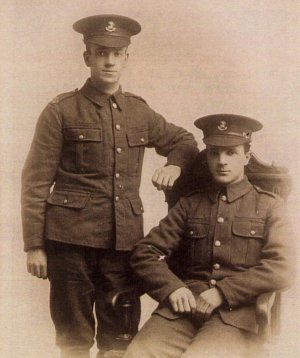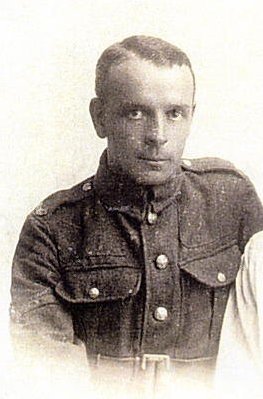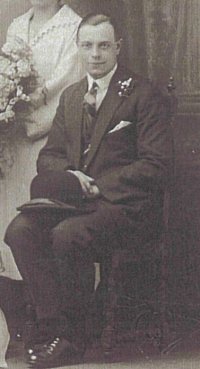

The War to End all Wars
Saul of Preston
from Trevor Saul
This article was originally published in the December 2002 edition of Soul Search, the journal of The Sole Society
Recently John Slaughter put me in touch with an employee of the Lancashire County Offices in Preston who is researching the 18 names on the First World War roll of honour there.
In 1914 Three Saul brothers worked at County Hall, a fourth, my father, worked at Lancashire Health Executive (The Panel). The following is a result of our shared research into the part played by my father and three brothers and relatives during that dreadful conflict of nations.
By 1914, my grandfather, Robert Saul, born Dec 1862 in Preston, had worked his way up from a tackler (fitter) to be the weaving manager of Spa Mill. The building is still there, as is the manager’s house at the mill gates. In 1914 the sons were Thomas Pemberton Saul aged 24, Frank aged 22, Harold Bannister, my father, aged 20 and Norman age 14.
War was declared on 4th August and Lord Kitchener of Khartoum appealed for 200,000 army recruits during August. These men were of the labouring classes. Educated business and professional people, although equally patriotic, did not see fit to enrol. Soldiers were uncouth, coarse and brutish people who did a good job fighting for the empire.
However on 21st August, Kitchener and Rawlinson petitioned and got ‘The Stockbroker Battalion’ together in London. Lord Derby of Liverpool then discussed with Kitchener the concept of ‘Pals Battalions’. The idea was that people who had worked together could fight together and not necessarily mix with regulars. The 17th Lord Derby became ‘the best recruiting sergeant in England’; recruiting offices were inundated with volunteers.
Thomas No22247 & Frank 22248 enrolled in The King’s Liverpool Reg. 20th Battalion in November 1914. Harold No30285 a bit later.
19th Battalion training was first at Knowsley Hall Liverpool, then at Belton Park, Grantham and finally on Salisbury Plain. The men trained in civvies at first, got up at 6:30, ran three miles before breakfast, then drill and trench digging, semaphore signalling etc, all Boer war practices.
They had one obsolete Lee Metford rifle between 100 men to dismantle and clean etc. They were not safe enough to fire. Lord Derby was accused of having his land cultivated by cheap labour, so paid the regiment compensation. There were breaches of discipline by men cleaning the stables, but who rode the horses into Liverpool, pilfering from the Hall kitchens etc. The men were becoming real soldiers. Tea was at 5pm and then they were free until lights out at 10-30. Local people held concerts etc. for them. Eventually Lee Enfield rifles were supplied and the men trained in their use.
In November 1915 the regiment embarked for France, real war. They were soon in line and casualties began, but at a ’normal’ rate. There were field punishments, men tied to gun carriage wheels.
Then came July 1st 1916, ‘The Somme’. They were at Montauban. On the first day they lost about 250 men, another 200 by 29th July. On 30th they attacked Guillemont. The ‘Kings’ lost about 500 men on that one day. Thomas was wounded in the neck, Frank pulled him into a shell hole and then continued with the advance, evacuating a brother would have been cowardice. Harold was with the 19th about 100 yards to the right (south). Bernard Montgomery was a staff officer for this section and described the awful conditions. News reached Preston that Thomas had severe wounds but was improving.
Thomas had taken leave to get married in April 1915. His wife Amy, daughter of a Preston Police Inspector, was a nurse with St. John’s and negotiated to go to France. Some how, Thomas’s father also arranged to go. Local papers say that they left on a Wednesday, and on the Thursday news came of Thomas’s death from wounds. He was at hospital no 10 Rouen. Amy stayed on nursing and Robert returned home a broken man.
From obituaries, Thomas had played football for Fleetwood and for Preston North End reserves. All the brothers played football and cricket for local teams.
On April 9th 1917, Easter Monday came the attack on the Hindenburg Line, which included Vimy Ridge. Harold and Frank were 12 miles south at St Martin sur Cojeul -- Heninel.
On that day my father was given a regimental appreciation, but no medal, for good services. The citation reads ’For conspicuous gallantry in action, when, as company runner, he carried messages to and from his platoons and advanced battalions HQ during the whole operations across the open under heavy shell and machine gun fire’. So, his luck held. About 100 of his pals were killed that day.
I have been to the field concerned, and visited the local cemeteries, also to the spot where Thomas was wounded. There are still trench lines visible and many ordnance shells, some live, placed by farmers at field corners. The Belgian army has the contract for collecting them.
Frank was awarded the military medal in 1918, but I don’t know why. John Slaughter thinks he may be able to find out. Frank was promoted to Acting Warrant Officer 2 Class in 1918. Harold finished as lance corporal. Promotion was slow in that war.
Norman was 17 in 1918. He never enlisted. He may have been exempt, but he worked in the same office as his brothers had. After the Somme attitudes had changed. Did his father prevail upon him? National discontent from bereaved families was mounting, so the Army raised the age of embarkment abroad to 19 years of age.
The wild enthusiasm of 1914 was gone, it was no longer a case of joining a queue along with cheering mates. What would you have done? The thing I remember him for is that he was a marvellous host at children’s parties, although he and his wife Muriel had no issue themselves.
The two surviving brothers returned to their jobs. All three brothers played cricket again, and got promoted at work. My father died of post operational pneumonia in 1940. My mother always blamed it on him having been gassed in the war.
Auntie Amy never remarried. I remember her as a cheerful outgoing person leading a full life. My grandfather Robert remained at Spa Mill as manager before retiring in 1928.
They never talked about the war!
Below - The four sons of Robert Saul

Frank & Thomas Saul

Harold Saul

Norman Saul